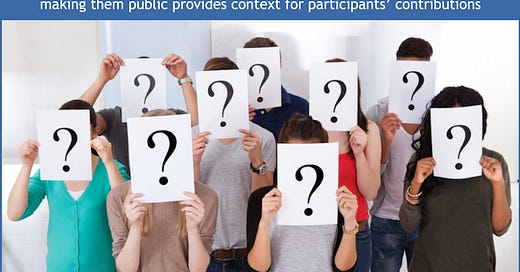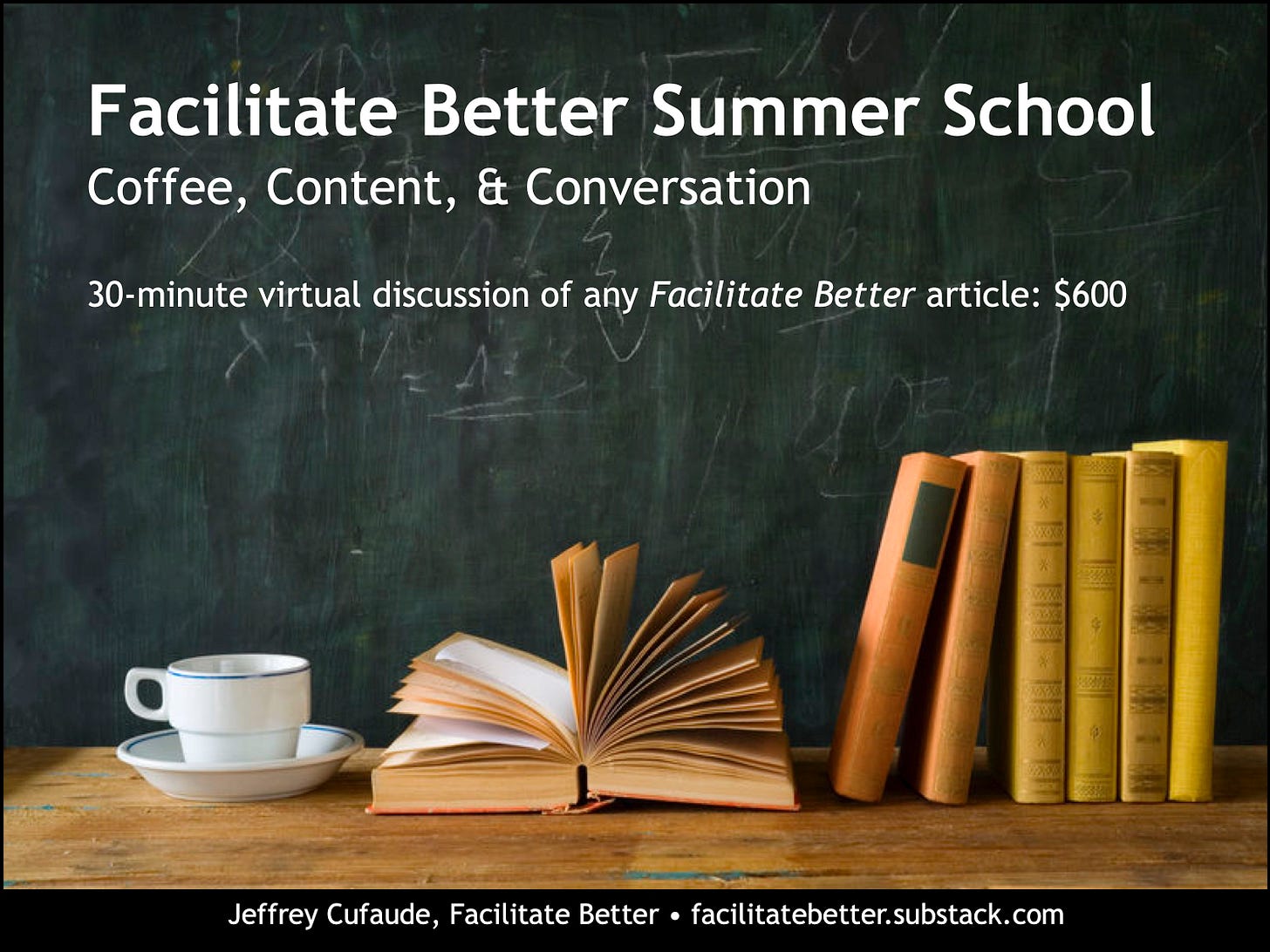Revealing and Exploring Hidden Agendas (Facilitation Friday #15)
Making individuals' interests, motivations, and agendas public can provide useful context for the content of what people share during a discussion.
It happened as it often does. I was facilitating a group of individuals convened to develop plans for a project.
During the first break I overheard a few people speak disparagingly about the “hidden agenda” of another participant. It reminded me again of the power of language ... in this case, the limiting language that had the potential to derail the work for which we had gathered.
I’m always somewhat bemused by talk of hidden agendas because they are almost always described as negative. People believed to have one are often perceived as untrustworthy or manipulative. Their contributions to a discussion may be ignored, viewed with suspicion, or given less consideration. But to assume a participant’s motivation or agenda is negative or problematic simply because it has not been disclosed is shortsighted.
In reality, all agendas remain hidden unless (1) individuals share their intentions unprompted—and some people certainly do—or (2) opportunities are created for everyone to share agendas early on in the formulation of a group and/or at a meeting. Effective facilitation makes it easier to do the latter.
When individuals’ agendas and motivations are public (think Johari Window) a group can then explore what they might mean for their efforts and for relationships among its participants. Until then, any judgments are merely guesswork (often inaccurate) based on the inferred motivations of others.
Helping Individuals Make Agendas Public
Individuals will have differing comfort levels with self-initiated disclosure to a group. Effective facilitation works with a group to create an equitable, inclusive, and safe climate that helps surface individuals’ agendas, motivations, and self-interests.
When doing so, I usually first point out the general benefits of knowing others’ perspectives related to a meeting’s purpose and outcomes, as well as the oft-assumed negative connotation of individual hidden agendas. A non-threatening invitation follows: "Everyone has some stake in the discussion and decisions today. Perhaps it would be helpful if we each shared our vested interest or intentions before we begin. What would you like others to most understand about the beliefs, perspectives, or positions you bring to this conversation?"
You can certainly solicit responses to this question in an advance survey (either anonymously or attributed), share a compilation of them as part of a meeting’s pre-work, and then explore their implications when the group convenes. I’m more likely to do this if the meeting time is brief and/or this is a one-off gathering of participants. If a group’s members will meet and work with each other regularly, I find it more beneficial for people to share their responses in real-time with each other as it feels more personal and relational.
Either approach may be a time when as a facilitator you can model the way for the participants, indicating your agenda related to the work: “My vested interest is in helping ensure we have an inclusive conversation and thoughtful deliberations, that a sound decision is reached, and that everyone leaves feeling they were heard even if they may not fully agree with the final decision(s).”
Having people share in real-time? Allow a few minutes for them to jot down responses to the question. This makes it easier for them to focus on listening when others share. Another tactic to support participants listening is to avoid linear sharing which can cause people to disconnect (oh my gosh, I’m next).
Instead, after someone finishes I ask “who would like to go next?” and look around the entire group instead of at the person adjacent to whomever just spoke. Another approach is to let the person who just spoke invite someone else in the group to go next: “I’d love to next hear from Carlos.”
Exploring Disclosed Agendas
Once agendas and interests are disclosed (either in survey responses or in person), facilitate a brief discussion to discuss their potential implications (so what? now what?) for the group’s work: “Given what people just shared, what might we need to do (or remain aware of) in order to accomplish the goals for today and to effectively work together in general?”
After posing this question, it is not unusual for some silence to follow, particularly for groups in the early stages of development. Individuals are both reflecting on the range of self-interests shared while simultaneously measuring how much of their own reaction they feel comfortable voicing to the group. Try not to fill it though with your own opinions. Someone in the group eventually will share.
While I encounter the following situations infrequently, you might wish to anticipate how you would handle them:
Based on what others disclose, a couple of participants are unsure they should be a member of the group or a participant in the meeting. This is more likely to happen at the first meeting of a group that people voluntarily join such as a committee.
Some participants believe another group member shared an agenda or self-interest that runs contrary to the purpose of the meeting or group or might be unhelpful or even destructive.
Many of the individual motivations and agendas shared seem to be in direct competition or incompatible with those of other participants.
Bottom Line?
Everyone in a group has self-interest. This is neither good nor bad. Group members or meeting participants learning about—and responding to—these interests and agendas can help accelerate their ability to work together. When made public, this information provides useful context for the content of what people share during a discussion.
Getting in Action
Other than the example shared in this essay, how else you might invite group members or meeting participants to reveal their agenda(s) and/or motivations? What question(s) might you pose and/or format would you use?
Think of the groups or meetings you will facilitate. In which ones might power and/or politics make it more difficult for individuals to freely and safely share their hidden agendas or motivations? How might you make it easier for them to do so?
Consider a time when you were a group member or meeting participant and felt uncertain about others’ motivations or agendas. What did that feel like? What were you thinking? How might these experiences inform the facilitation choices you make?
Looking for a simple and affordable way to enhance the ability of you, your colleagues, your presenters, and your volunteers to Facilitate Better meetings and workshops this fall and beyond?
Let me suggest “Facilitate Better Summer School.” Here's the scoop.
I’ll help you select one of my Facilitate Better essays (currently online or previously published) most related to your learning outcomes and we’ll identify a mutually agreeable time for a 30-minute virtual conversation in June, July, or August.
You’ll register and share the article with participants to read prior to the session; supply the virtual platform, and provide both a moderator and tech person to manage the session.
I’ll join you and your participants online for a 30-minute discussion of the selected article, respond to moderator questions and participant questions (solicited in advance and in real-time), as well as expand on the content in your chosen essay.
Your investment?
$600, a 20% reduction from the usual fee.
Schedule three sessions for even more savings!
$1500 total or $500 each, a 35% reduction from the usual fee.
To express interest or learn more, complete this form:
https://lnkd.in/gHj2ByVZ
© Facilitate Better and Jeffrey Cufaude. All rights reserved.
To affordably license this content for reprint on your site or in electronic or print communications or to contact me regarding customized facilitation skills workshops or consultations, complete this form.






Thank you for this. And what a brilliant idea - the "Facilitate Better Summer School." I'll highlight this in my response in case people don't read this to the end.